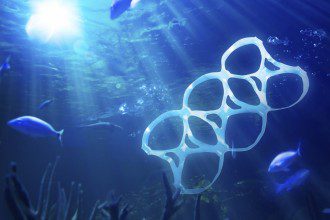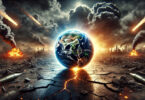Guest Writer for Wake Up World
The world was first introduced to what is now known as plastic in 1907, and has used it ever since. Today, plastic is discarded throughout our oceans, catastrophically changed our world. The ocean is becoming a “plastic soup” due to the astonishing level of plastic debris and toxicity it causes.
The Chemicals in Plastic
Plastic, by chemical composition, contains bisphenol A and styrene trimer. Bisphenol A is a polycarbonate, or a hard, clear plastic often used in water bottles and food packaging. BPA can seep into food and water causing a risk of health effects on our nervous system, unborn fetuses, and children.
[pro_ad_display_adzone id=”110028″]
Styrene trimer is a potential carcinogen commonly found in disposable utensils. Research has lead scientists to believe there is a link between this chemical and cancer as well as an increase in thyroid hormone levels.
Recent studies have shown an increase of both BPA and styrene trimer in the ocean surfaces and at the deep sea levels. Previously, it was believed that plastic could not disintegrate in ocean water, and would accumulate resulting in “messy or polluted water”. However it is now estimated that plastic disintegrates within a year of entering the ocean, adding toxins to the chemical composition of sea water.
Perhaps one plastic cup or even 100 would not make a significant difference, however billions of plastic cups and pieces are dumped into our oceans worldwide.
Plastic And The Oceanic Ecosystem
Wake up world! The ocean’s ecosystem is suffering from the misuse and inappropriate disposal of plastic. The chemicals BPA and Styrene trimer have seeped into the ocean, causing the premature deaths of marine organisms.
Marine life drink, breathe and breed in ocean water. Roughly 44 percent of seabirds, which feed off organisms in the ocean, have mistakenly consumed plastics, which has caused countless deaths of these ocean animals. One form of plastic in particular, ingested by sea life, is causing much distress to the marine ecosystem: Microbeads. Microbeads are tiny plastic balls often found in cosmetic cleansers despite having no clinical value as far as dermatology is concerned — yet they are common in our oceans.
It may seem odd to think of a substance washing down your drain ending up in the ocean, but it happens every day. And as a result, an imbalance in the oceanic ecosystem leads to an imbalance in our ecosystem.
How Plastic Affects You
The world is connected. Humans, animals and plants share the natural world and can equally take care of each other, or do harm. Plastic, due to our misuse, has affected our oceans and led to increased levels of toxicity and pollution in the oceanic ecosystem. This rift in the ecosystem has entered the food chain, altering the state of health for marine life, wildlife, and ultimately, our health.
Human life is being affected since the fish and other “seafood” being consumed may be contaminated with chemicals from plastic. Yes, the plastic you originally thought was thrown out is now re-appearing in your food — at a toxic level. BPA has been all over the news in regards to the harm it may have on humans. If it is dangerous to drink water out of a bottle made with BPA, how come preventing fish and other marine life from becoming intoxicated with BPA is not talked about?
The oceans are also a primary source of oxygen and other vital atmospheric components. According to a recent EarthSky.org report, “most of Earth’s oxygen comes from tiny ocean plants – called phytoplankton – that live near the water’s surface and drift with the currents.” With plastic poisoning the water they live in, oxygen-making marine plants aren’t able to create the oxygen we breathe.
The Final Word
Humans must take a positive role to prevent further intoxication within our oceans. Cease buying plastic items, purchase refillable glass water bottles, shop for groceries using a reusable bag, and if you do have to buy plastic, recycle it correctly.
The answer to the question “Does plastic in the ocean affect you?” is a definitive YES! Plastic in the ocean affects you, your family, friends, pets, and the entire world around you. And until we stop adding to the problem, it’s only going to get worse.
Do something positive today.
Map of Plastic Garbage in the Oceans
References:
- http://www.mayoclinic.org/healthy-lifestyle/nutrition-and-healthy-eating/expert-answers/bpa/faq-20058331
- http://www.ncbi.nlm.nih.gov/pubmed/18560529
- http://castilesoap.com/blog/is-castile-soap-good-for-the-environment
- http://news.nationalgeographic.com/news/2015/02/150212-ocean-debris-plastic-garbage-patches-science/
- http://serc.carleton.edu/NAGTWorkshops/health/case_studies/plastics.html
- http://www.ncbi.nlm.nih.gov/pubmed/22837102
- http://earthsky.org/earth/how-much-do-oceans-add-to-worlds-oxygen
- http://news.nationalgeographic.com/news/2014/07/140715-ocean-plastic-debris-trash-pacific-garbage-patch/
Previous article by Audrey Lefebvre:
About the author:
Audrey Lefebvre R.N. specializes in Integrative Medicine, incorporating traditional and holistic care. Audrey holds over 5 years of experience in direct patient care and 4 years in the practice of Mind, Body and Spirit Care under the supervision of Dr. Ron Shemesh, M.D.
Audrey has made several distinguished contributions to media outlets such as Mother Earth Living and Natural News. Topics discussed include natural skincare regimens and alternative ways to improve our lifestyle.
You can connect with Audrey at:
- Website: castilesoap.com/blog
- Facebook: www.facebook.com/classicsong
- Twitter: twitter.com/castilesoapUSA
[pro_ad_display_adzone id=”110027″]









